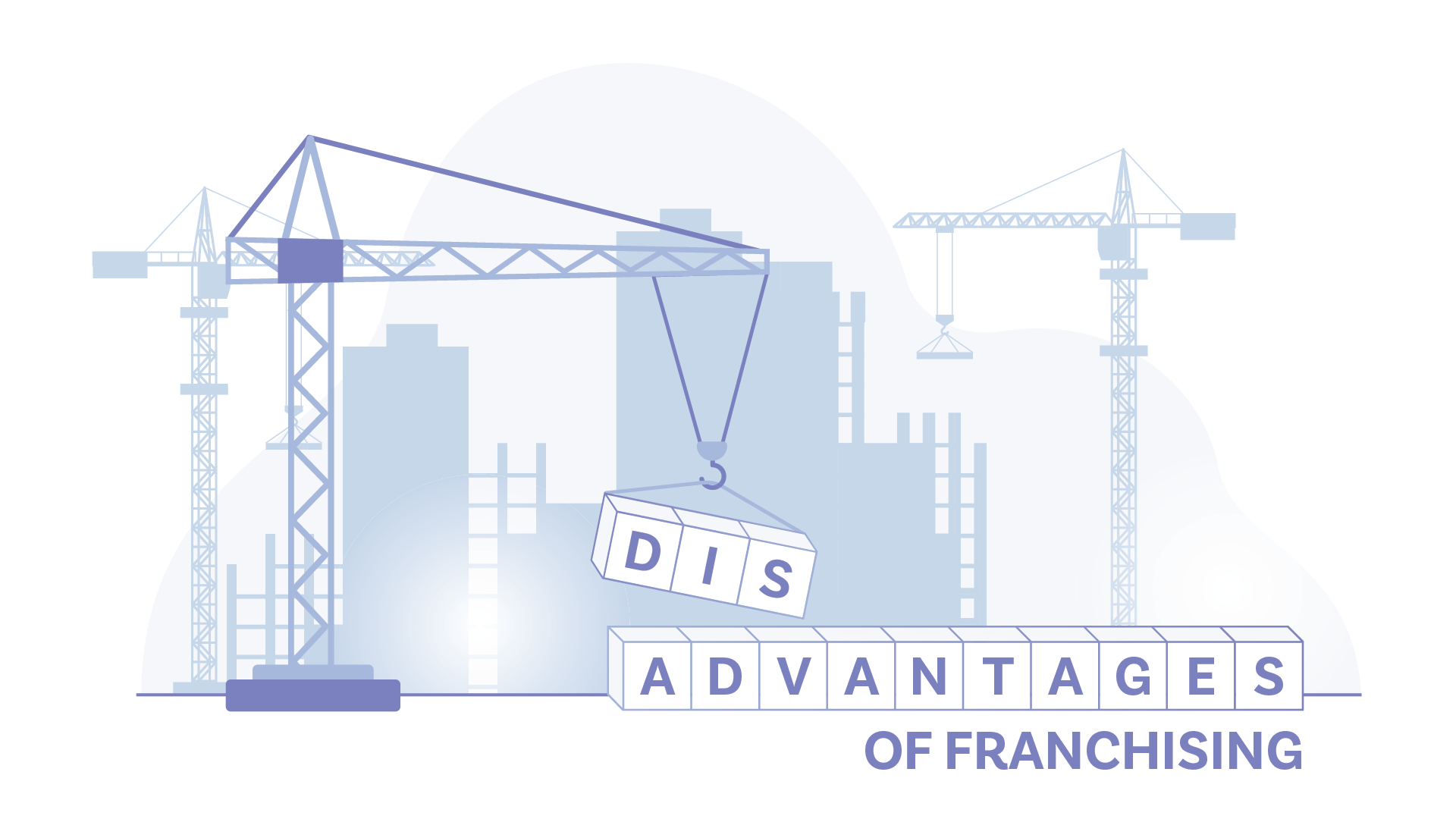When considering the leap into business ownership, franchising is a compelling option. Often celebrated for its blend of freedom and support, buying a franchise is the best of both worlds. But like in any significant investment, franchising comes with its own set of pros and cons that potential buyers must carefully evaluate.
At FBA, we believe in transparency and making informed decisions. We’re not here to sell you a dream without showing you the full picture. Owning a franchise can be an incredible opportunity, but it’s not as simple as snapping your fingers and achieving overnight success. There are complexities to manage, and finding the right fit is crucial above all else—which is precisely where our expert Brokers excel (more on that soon).
This article lays out the advantages and disadvantages of franchise ownership clearly and comprehensively. We want to ensure you weigh these factors thoroughly, with an understanding of both the potential rewards and real challenges.
11 Advantages of Franchise Ownership
Franchising presents a unique avenue for individuals looking to step into business ownership with a network of support and proven systems. Here, we explore the 11 key advantages that make franchising an attractive option for entrepreneurs.
1. Proven Business Model
Franchises offer a blueprint for success that has been tested and refined across multiple markets. This proven model reduces the guesswork and risks associated with starting a business from scratch, providing you with a clear roadmap to follow.
Often, when individuals contemplate business ownership, they envision the traditional startup route—a path filled with uncertainty, where even a great business plan and groundbreaking idea may require years of trial and error to refine. In contrast, franchising offers a systematic approach with well-defined procedures and outcomes, effectively streamlining the journey to operational success.
2. Brand Recognition
One of the most significant benefits of buying into a franchise is the instant brand recognition you gain. Established franchises bring with them customer loyalty and trust that can take years, if not decades, to build on your own. This recognition provides a substantial competitive edge from day one, as customers are more likely to patronize a business they already know and trust.
Moreover, franchises often participate in national advertising campaigns that further solidify brand presence and ensure that you are part of a broader promotional effort. These campaigns enhance local marketing initiatives, providing franchisees with a level of visibility that would be costly and challenging to achieve as an independent business owner.
3. Training and Support
Franchisors offer extensive training programs and ongoing support to ensure you are fully equipped to manage your franchise effectively. This support is crucial, particularly for new business owners who may not have experience in the industry or in managing a business. The training usually covers a wide range of necessary skills and knowledge, from daily operations and staff management to advanced marketing strategies and customer service.
Additionally, many franchisors offer dedicated support lines and staff who can assist with specific challenges as they arise. Whether it’s a marketing issue or a supply chain problem, having access to experts who understand the intricacies of the business can make a huge difference in how effectively you can respond to and overcome challenges.
4. Easier Access to Financing
Financing a franchise often proves easier than securing funds for a start-up business. This advantage is particularly appealing to new entrepreneurs who might not have tons of cash at hand. Banks and other financial institutions tend to favor franchises due to their established business models and lower risk profiles. An established franchise comes with a proven track record of success, detailed historical financial performance data, and brand recognition, all of which significantly reduce the perceived risk for lenders.
The support from a franchisor can also extend to financing. Many franchisors have established relationships with specific banks and financial institutions, which may offer special financing packages to franchisees. These packages might include lower interest rates, reduced fees, or more favorable repayment terms, all of which can make the financial burden of starting and running a business more manageable.
5. Higher Success Rate
Franchises generally exhibit higher success rates than independent start-ups. The structured nature of a franchise provides a solid foundation for business operations.
The extensive support from the franchisor, including training, operational guidance, and strategic marketing, contributes to this higher probability of success. These elements significantly de-risk the investment and provide a safety net that is often lacking in independent ventures.
6. Purchasing Power
One of the more understated benefits of franchise ownership is the purchasing power it affords. Franchisees benefit from the collective buying power of the entire network, which can lead to significantly lower costs for goods and supplies. This is due to bulk purchasing agreements and preferred vendor relationships negotiated by the franchisor, which individual businesses might not be able to access on their own. This collective bargaining power helps improve profit margins and reduce overhead costs, making operations more efficient and financially sustainable.
7. Exclusive Territories
Most franchisors offer exclusive territories as part of their franchise agreement, which means franchisees won’t face competition from within the same brand in their designated area. This exclusivity is crucial as it minimizes internal competition and allows franchisees to capitalize fully on their market’s potential.
By securing a specific territory, you can focus on growing your customer base without the threat of another franchise unit cannibalizing your sales.
8. Flexible Options
Franchising extends far beyond the traditional brick-and-mortar model, offering diverse opportunities that cater to varying investment levels and operational roles. Whether you’re eager to dive into day-to-day operations or prefer to adopt a more strategic, semi-passive role by managing from a distance, franchising accommodates diverse entrepreneurial styles.
This flexibility includes options for low to no overhead businesses that can be operated remotely, expanding the possibilities for business ownership. Such versatility allows individuals to tailor their franchise involvement to match their personal goals, lifestyle preferences, and financial capacities.
9. Community and Networking
Joining a franchise system means becoming part of a broader community. This network includes not only the franchisor but also fellow franchisees who can provide invaluable support. The shared experiences within this community foster a sense of camaraderie and offer a well of resources for troubleshooting, advice, and encouragement.
In the world of business, where it’s often said, “it’s lonely at the top,” franchising offers a counter experience—you’re never alone. This collaborative environment ensures you have the support and connections needed to thrive, turning the journey into a shared adventure with like-minded entrepreneurs.
10. Innovation and Growth
Franchisors are continually on the lookout for ways to innovate and improve their offerings to stay competitive in the market. This drive for innovation means regular updates to products and services, which keeps the brand relevant and appealing to consumers. As a franchisee, you benefit from these innovations without bearing the full costs of research and development typically required for such advancements. This setup allows you to offer cutting-edge products or services while focusing your resources on day-to-day operations and growth.
11. Structured Exit Strategy
Owning a franchise often comes with a structured exit strategy, making it potentially easier to sell the business compared to independent ventures. Thanks to the established brand recognition and the operational blueprint provided by the franchisor, franchises are typically seen as less risky investments by potential buyers. This brand equity, combined with proven operational systems, can increase the business’s marketability and value when it’s time to sell. For franchisees looking to transition out of business ownership, whether for retirement or to pursue other interests, having a clear, supported pathway to sell the business can be a significant advantage.
Each of these 11 advantages contributes to why franchising remains a popular choice for entrepreneurs who want a mix of independence and support. As we move forward, we’ll also consider the few disadvantages, providing you with a balanced view to make an informed decision about entering the world of franchising.
7 Disadvantages of Franchise Ownership
After exploring the significant advantages that make franchising an appealing and viable business option, it’s essential to consider the challenges and limitations that prospective franchise owners might face.
Understanding these potential drawbacks is crucial to making a well-rounded decision about an investment.
1. Initial Capital Investment
The initial investment required to purchase a franchise can seem substantial. This capital covers franchise fees, startup costs, and other necessary investments before operations begin. While the upfront cost may appear daunting compared to starting an independent business, it’s important to consider the value provided. Franchises offer a “turnkey” business model, which significantly reduces the trial and error associated with independent ventures. The initial fee often includes the cost of location, equipment, and initial training—expenses that would otherwise need to be sourced and negotiated independently.
While buying a franchise may seem like a high “all-in” upfront investment, it is structured to cover essential startup needs, unlike the unpredictable costs of an independent startup where you might find yourself continuously investing additional funds.
Read This Resource: What does it costs to buy a franchise and where is your money going?
2. Ongoing Royalty Fees
Franchisees are typically required to pay ongoing royalty fees, which are usually a percentage of gross sales, to the franchisor. These fees are intended to cover the continuous support services and brand marketing provided by the franchisor. While these fees ensure you receive ongoing assistance and benefit from national advertising campaigns, they can also impact overall profitability, especially during times when business revenues are lower than expected.
3. Less Creative Control
One of the trade-offs of franchise ownership is the reduction in creative control. Franchisors enforce guidelines to ensure brand consistency across all locations. This standardization means franchisees have less freedom to alter product offerings, decor, and operations to suit their local market’s unique tastes and preferences. For those who value total independence and the ability to innovate freely, this can be a drawback.
Franchisees must operate within the confines of the system’s established guidelines, which can restrict the ability to make changes that might otherwise benefit a locally tailored business strategy.
4. Contractual Obligations
Franchise agreements involve long-term commitments and can include complex terms that bind the franchisee to specific operational standards and rules. These contracts are legally binding, and failing to adhere to them can be consequential, including the potential loss of the franchise. Prospective franchisees must understand these agreements thoroughly to ensure they can meet the franchisor’s expectations.
5. Dependence on Franchisor Success
Franchisees’ success is closely linked to the franchisor’s overall health and reputation. If the franchisor encounters financial difficulties, management issues, or public relations crises, it can negatively impact all its franchisees. This interdependence means that your business’s success can be affected by factors outside your direct control.
Choosing the right franchise becomes crucial in this context. While no business is entirely risk-free, franchising typically offers a lower-risk pathway. However, it’s essential to recognize that unpredictable factors can still influence the health of a brand.
During the franchise discovery process, you have the opportunity to review a brand’s track record—information that is transparent and readily available. This allows you to make an educated decision based on the historical performance and resilience of the franchise, helping to minimize future risks.
6. Products and Service Restrictions
Franchise agreements often stipulate specific products or services that franchisees must offer and can mandate purchases from approved suppliers. This arrangement can limit a franchisee’s ability to source independent supplies.
It’s important to note that the franchisor’s system is designed with the franchisee’s success in mind. These purchasing requirements are typically integrated into the overall investment calculation, providing you with a clear expectation of potential costs. However, the degree of supplier restriction can vary significantly between brands. This again underscores the importance of thoroughly evaluating your options during the franchise selection process to ensure that the terms align with your business goals and financial plans.
7. Renewal Challenges
At the conclusion of a franchise agreement term, franchisees are not 100% guaranteed a renewal contract. The decision to renew often hinges on various factors, which can extend beyond the individual franchisee’s performance. This lack of guaranteed renewal introduces an element of risk, potentially impacting long-term business planning and investments.
It’s important for franchisees to understand that success within the franchising model is typically measured against specific metrics set forth by the franchisor. These performance indicators help franchisees track their progress and align their operations with the franchisor’s standards. If issues arise, the franchisor usually provides guidance and support to help improve performance. Effective communication and a proactive approach in maintaining the health of the business are crucial. By staying aligned with the franchisor’s expectations and actively engaging with the support offered, franchisees can position themselves favorably when it comes time for contract renewal.
FBA Franchise Brokers Assist in Navigating Advantages and Disadvantages
Nobody said buying a franchise isn’t complex. That’s why having an expert by your side can make all the difference. FBA Franchise Brokers are thoroughly trained not only to reiterate and further explain the advantages and disadvantages of owning a franchise but also to tailor their guidance to your specific situation. They understand that franchising isn’t one-size-fits-all, and their expertise is in matching you with the RIGHT franchise opportunity for YOU.
Our Brokers take a consultative approach, starting with a deep dive into what you seek from business ownership. They meticulously walk you through various options, highlighting franchises that offer the best fit for your lifestyle, budget, and long-term goals. Whether you’re drawn to the robust support systems of a large franchise or the flexibility of a smaller, emerging brand, our Brokers are skilled at navigating the franchise landscape to pinpoint the ideal opportunities for you.
They’re with you every step of the way—from the initial discovery sessions to the final closing of your business deal—ensuring a seamless and successful transaction. By presenting you with well-vetted brands and guiding you through the evaluation process, FBA Brokers effectively mitigate many of the risks associated with franchise ownership. This comprehensive support helps address potential disadvantages, turning them into manageable aspects of a well-informed investment decision.
Balancing the Scales of Franchise Ownership
So, how do the advantages and disadvantages of franchise ownership weigh up against each other? While franchising isn’t 100% challenge free, the benefits tend to tilt the scales favorably for many aspiring entrepreneurs.
The key to a successful franchise investment comes from making an informed decision, one that considers all facets of the opportunity at hand. With the guidance of an FBA Franchise Broker, you can navigate your options with clarity and confidence, finding a franchise that not only fits your financial goals but also aligns with your lifestyle and values.
Ready to take the next step in exploring franchise opportunities tailored just for you?
Connect with an FBA Franchise Broker today and start your journey towards becoming a successful business owner. It’s time to turn your career aspirations into reality with the right partnership and the right franchise.



